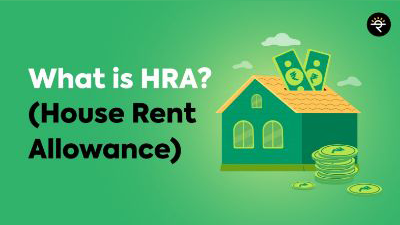Let’s say you have received a job opportunity in a big city, far away from your home town. It’s the job of your dreams in the city of dreams, Mumbai!
While discussing with your friend about moving to Mumbai for this amazing job, he tells you about how exciting but challenging it is to live in Mumbai; the crowded local trains, the need for you to constantly be on your toes, and the most important thing, the rent expenses being sky-high.
After giving it a thought, you realize, you are quite excited about the fast life and travelling in local trains, but, oh no!! What about the high rent expenditure? How will you manage that? Will your employer give you any extra money in addition to your salary for the rent expense?
Let’s find out...
HRA (House Rent Allowance) is a benefit given by the employer to the employee for his house rent expenses. Okay then! You check your offer letter and YASS! Your problem is solved! Your gross salary includes HRA! But wait, what about the increased tax liability on the increased income? Well, that problem will also be solved in a few minutes!
Tax benefits of HRA
Although the allowance leads to an increase in gross salary, it is not fully taxable under the Income Tax Act, 1961. As per section 10(13A) of the Income Tax Act,1961, read with Rule 2A of the Income Tax Rules, the least of the following will be exempted, and will not form part of the taxable income:
2. 40%/50%* of salary**
3. Actual Rent paid in excess of 10% of salary**
Salary for this purpose = Basic salary + Dearness allowance (In terms i.e. forming part of retirement benefits)
** 50% for metro cities (which includes Chennai, Kolkata, Delhi, Mumbai) and 40% for other cities
I know, this complex calculation is beyond the understanding capacity of a layman. But don’t worry, let’s see some examples to understand this calculation better.Example 1:
Let’s say, Mr P, residing in Mumbai has the following receipts from his employer:
Basic Salary (pa) Rs.8,50,000
DA (In terms) Rs.20,000
HRA received Rs.4,20,000
Actual rent paid Rs.5,30,000
Therefore, the exemption shall be the least of the following.
1. Actual HRA received – 4,20,000
2. 50% of salary - 4,35,000
3. Actual rent paid (–) 10% of salary – 4,43,000 (5,30,000 – 87,000)
Mr. X, residing in Pune has the following receipts from his employer:
Basic Salary (pa) Rs.6,50,000
DA (In terms) Rs.15,000
HRA received Rs.2,40,000
Actual rent paid Rs.3,00,000
Therefore, the exemption shall be the least of the following:
1. Actual HRA received - Rs.2,40,000
2 .40% of salary – Rs.2,66,000
3. Actual rent paid (–) 10% of salary – Rs.2,33,500 (3,00,000-66,500)
Exemption = Rs.2,33,500
2.HRA is fully taxable for employees who do not pay any rent or the accommodation occupied is owned by him/her.
3.To avail of the HRA exemption, the employee has to provide rent receipts to the employer as proof of rent payment.
So, I hope you now know what HRA (House Rent Allowance) is and how it is taxed. Until next time!












